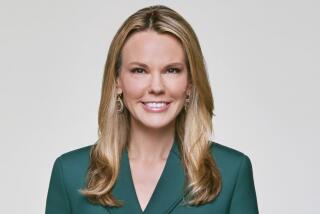NBC’s Chairman Names His Heir
- Share via
Jeff Zucker is the apprentice no more.
Proving wrong those who had predicted that NBC’s precipitous ratings slide in prime time would cost him his job, the 40-year-old television president Thursday was named the successor to Bob Wright, chairman and chief executive of NBC Universal.
“All he has to do is survive 2006, 2007 and a few years after that,” Wright said jokingly during a conference call with reporters. The 62-year-old Wright, who will celebrate his 20th anniversary as head of the network next year, said he wasn’t retiring yet.
Wright unveiled his heir apparent as part of a broad reorganization that consolidates all of the company’s television operations under Zucker, whose new title is chief executive of NBC Universal Television.
Beginning immediately, three executives who previously were at the same level as Zucker -- head of network operations Randy Falco, sports chairman Dick Ebersol and TV station group chief Jay Ireland -- will report to Zucker instead of Wright.
Thursday’s reorganization also brings back to NBC a rising star from its parent company, General Electric Co. Beth Comstock, who was NBC’s communications chief before going to GE, will be in charge of digital media and marketing. Ron Meyer remains president of Universal Studios and will continue to report to Wright.
Thursday’s announcement ended months of speculation in Hollywood about Zucker’s future. The brash executive, who is now based in New York, spent four frustrating years on NBC’s Burbank lot, searching in vain to find a new hit to replace the comedy blockbuster “Friends.” He found a winner in Donald Trump and “The Apprentice,” but it wasn’t enough to keep the peacock on top.
Last year, NBC fell from first to fourth place in prime-time ratings. Still, Zucker’s leadership skills have won him two steadfast supporters: Wright and GE Chairman Jeffrey Immelt.
Wright and Zucker said Thursday that a more streamlined structure was needed to make NBC Universal more nimble, with the heads of their different business units working together as a team.
They offered an example of how the old structure led to confusion in the marketplace: This fall, two executives on different coasts negotiated similar deals to allow downloads of NBC Universal shows. One spearheaded talks with satellite television firm DirecTV Group Inc., while the other hammered out a deal to make shows available for Apple Computer Inc.’s new video iPod.
In addition, NBC Universal had been in talks with Apple CEO Steve Jobs before rival Walt Disney Co. stole its thunder by announcing the first deal to allow next-day video downloads.
Zucker said the reorganization should allow the company “to go to market that much quicker and smarter and better.”
Falco, who was installed as NBC Universal Television chief operating officer, agreed. “We’re now coming to the market with one voice,” he said.
News of Zucker’s pending ascension led some analysts to praise GE for calming the waters.
“This lends stability to the company,” said Brad Adgate, director of research for ad buying firm Horizon Media. “It’s always good to let people know who’s in charge.”
The NBC Universal executives emphasized that there was nothing special about the timing of Thursday’s announcement. Sources close to the situation, however, said that Immelt wanted to unveil the new plan before the company’s annual strategy session in Boca Raton, Fla., in early January.
Wright and Immelt also were eager to end bickering that resulted from NBC Universal’s disappointing showing at the so-called upfront market in May, where networks reveal their fall lineups to advertisers, executives close to the situation said. NBC entered the upfronts with only six new series, compared with ABC’s 12 and CBS’ eight.
NBC sales executives then asked advertisers to pay rates 2% higher than in 2004, even though the network had suffered a 17% decline in prime-time ratings in its coveted audience of 18- to 49-year-olds. Advertisers balked, and NBC took in nearly $1 billion less in ad commitments than it had the year before.
Zucker started his career at NBC in 1986 as a researcher in the sports division. The Miami native moved to NBC News three years later. In 1992, at age 26, he became the youngest executive producer of the “Today” show.
More to Read
The biggest entertainment stories
Get our big stories about Hollywood, film, television, music, arts, culture and more right in your inbox as soon as they publish.
You may occasionally receive promotional content from the Los Angeles Times.











